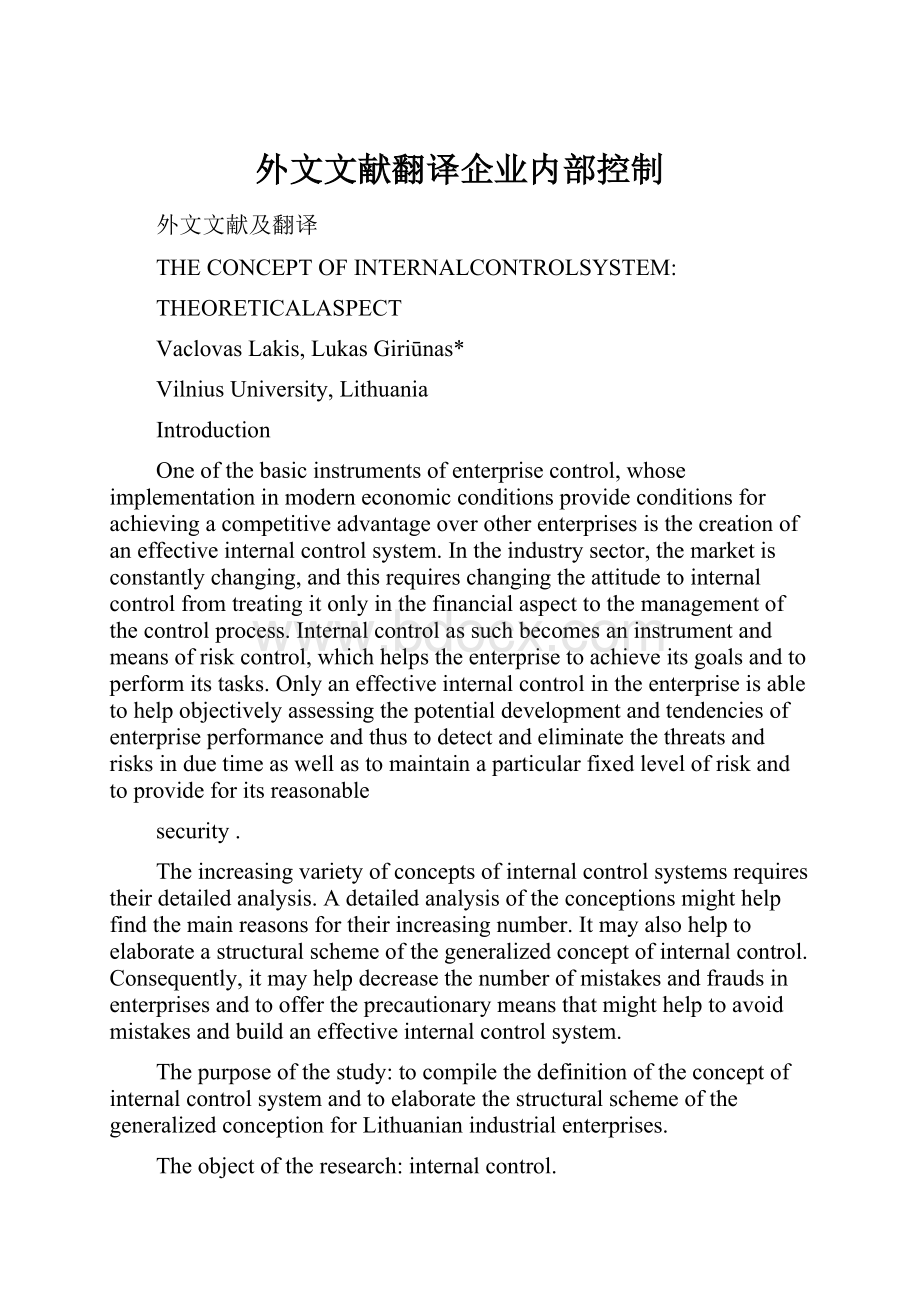外文文献翻译企业内部控制.docx
《外文文献翻译企业内部控制.docx》由会员分享,可在线阅读,更多相关《外文文献翻译企业内部控制.docx(15页珍藏版)》请在冰豆网上搜索。

外文文献翻译企业内部控制
外文文献及翻译
THECONCEPTOFINTERNALCONTROLSYSTEM:
THEORETICALASPECT
VaclovasLakis,LukasGiriūnas*
VilniusUniversity,Lithuania
Introduction
Oneofthebasicinstrumentsofenterprisecontrol,whoseimplementationinmoderneconomicconditionsprovideconditionsforachievingacompetitiveadvantageoverotherenterprisesisthecreationofaneffectiveinternalcontrolsystem.Intheindustrysector,themarketisconstantlychanging,andthisrequireschangingtheattitudetointernalcontrolfromtreatingitonlyinthefinancialaspecttothemanagementofthecontrolprocess.Internalcontrolassuchbecomesaninstrumentandmeansofriskcontrol,whichhelpstheenterprisetoachieveitsgoalsandtoperformitstasks.Onlyaneffectiveinternalcontrolintheenterpriseisabletohelpobjectivelyassessingthepotentialdevelopmentandtendenciesofenterpriseperformanceandthustodetectandeliminatethethreatsandrisksinduetimeaswellastomaintainaparticularfixedlevelofriskandtoprovideforitsreasonable
security.
Theincreasingvarietyofconceptsofinternalcontrolsystemsrequirestheirdetailedanalysis.Adetailedanalysisoftheconceptionsmighthelpfindthemainreasonsfortheirincreasingnumber.Itmayalsohelptoelaborateastructuralschemeofthegeneralizedconceptofinternalcontrol.Consequently,itmayhelpdecreasethenumberofmistakesandfraudsinenterprisesandtooffertheprecautionarymeansthatmighthelptoavoidmistakesandbuildaneffectiveinternalcontrolsystem.
Thepurposeofthestudy:
tocompilethedefinitionoftheconceptofinternalcontrolsystemandtoelaboratethestructuralschemeofthegeneralizedconceptionforLithuanianindustrialenterprises.
Theobjectoftheresearch:
internalcontrol.
Toachievetheaim,thefollowingtaskswerecarriedout:
toexaminethedefinitionsofinternalcontrol;todesignaflowchartfortheexistingdefinitionsofinternalcontrol;toformulateanewinternalcontrolsystemdefinition;?
toidentifytheplaceoftheinternalcontrolsysteminacompany’sobjectivesand?
itsmanagementactivities.
Studymethods:
fortheanalysisoftheconceptionsofcontrol,internalcontrol,theconceptofinternalcontrolsystem,systematicandcomparativemeansofscietificmethodsofanalysiswereused.
1.Researchofcontrolconception
AccordingtoJ.Walsh,J.Seward(1990),H.K.Chung,H.LeeChong,H.K.
Jung(1997),controlmaybedividedintotwotypes–internalandexternalcontrolsthosemighthelptoequalizeauthorityorconcernedparty‘sattitudestosomecertainorganizationcontrol.Internalcontrolinvolvesthesupremeenterprisecontrolapparatusandenterpriseshareholders,whereasexternalcontrolmightbedefinedasthepowerinthemarketorbranch,competitiveenvironmentorstatebusinessregulation.Suchanalyticaldivisionisessentialwhenanalysingindustrialorotherenterprises,becausethisattitudetocontrolmakesitmorespecificandproperlydefined.
Theidentificationofanappropriateprimarytheoreticalbaseisanimportanttaskinformingthestructureofknowledgeaboutthestudysubject.Appropriatelyselectedconceptionsenabletoelucidatetheessenceoftheprocesses,tocharacterizethemandtorealizetheirinterplaysandinteractionprinciples.Conceptionsmaybedefinedasasummationofempiricalcognitionwhichtransformspracticallyachievedresultsintoconceptions.Theaboveideasmightbetakenasabstractionsandleadtoanungroundedconclusion,andthroughconceptionstherealitymightbelost.Operatingwithmorethanoneconceptionsallowstoformauniversalopinionaboutthereality.Noteworthy,whenoperatingwithconceptionsanoptimalagreementmightbefoundbetweentheoryandpractice:
usingthecommonpointofcontact–conceptions–atheoristandapracticianwillalwaysfindthewayandunderstandoneanother.
Themainproblemofinternalcontrolisrelatedtothedefinitionofcontrolconceptionandtheidentificationoftheplaceofinternalcontrolinanorganization.Constantchangesoftheextent,functionsandrolesofinternalcontrolenabletoformacommondefinitionofinternalcontrolandtoidentifyitsplaceinanorganization.
Analysisoftheconceptofinternalcontrolanditsinterpretationareessentialforassessingtheinternalcontrolsystem,becausetheconceptionofcontroliswidelyusednotonlyinscientificresearch,butalsointhedailyactivitiesofanenterprise;thereforethesameconceptionmighthavealotofvariousmeaningsandinterpretations.Analysisoftheconceptprovidesconditionsforthefurtherresearch,becauseitisimpossibletoformamodelofinternalcontrolassessmentiftheresearchobjectisunknown.AlotofdefinitionsandvariationsofcontrolcanbefoundinthepublicationsbyLithuanianandforeignscientistsandinpublicinformationsources.Forexample,intheDictionaryofInternationalWords(2002),controlisdefinedas:
supervision,inspectionofsomething;comparisonofactualandrequired?
conditions;
anenterpriseoragroupofpeoplethatcontroltheworkandresponsibilityofother?
enterprisesorgroupsofpeople;maintenanceofsomething.?
Inadditiontotheaboveseveninternalcontrol,anddocumentationcontrol.Performancecontrolandworkerqualitycontrol,etc.Thenewsystemofaccountingsupervisionsystemontheunitinterior,themaincontentsoftheinternalcontrolsystem.
Ontheotherhand,inthespecializedDictionaryofEconomicTerms(2005),controlisdefinedasaperformancewithadefiniteinfluenceonthemanagementofanenterprise,asrightsbasedonlawsandcontractsthatinvolveproprietaryrightstothewholepropertyoritspart,oranyotherrightsthatenabletoexertasignificantinfluenceonthemanagementandperformanceofanenterprise,orstatesupervision.Evenincommoninformationsourcesthedefinitionsofcontrolareformulateddifferently,althoughthecommonmeaningisquitesimilar.Analysisandpractical
studiesofLithuanianscientists’worksenabletostatethatthereisnoonesolidconcept,definitionordescriptionofcontrol.Forexample,E.Bu?
kevi?
iūt?
(2008)saysthatwhencontrolismoreparticularlydefined,itsrulesandrequirementsaredescribedinmoredetail,itbecomesmoreeffective,morespecific,morepsychologicallysuggestive,itgivesmorefreedomlimitsofchoiceforsupervisorsandlesspossibilitiesoflawlessnessforpeopleundercontrolwhen.Identifyingtheobjectoftheresearch,itshouldbenotedthatdifferentdefinitionsofcontrolaregiveninscientificstudiesbySakalas,2000;Navickas,2011;Katkus,1997;Bu?
kevi?
iūt?
2008;Drury,2012;Bi?
iulaitis,2001;LeeSummers,1991;Patrick,Fardo,2009;Spencer,Pickett,2010;Gupta,2010andotherLithuanianandforeignscientists(seeFig.1).
Thedifferentconceptionsandtheirinterpretationsindicatethatthereisnosolidopinionabouthowtodefinecontrol,andevenscientistsandpracticiansthemselvesdonotagreeuponaunifieddefinitionordescriptionofcontrolortheconceptionofinternalcontrolanditsinterpretations.Inscientificliterature,differentinterpretationsofcontrolconceptionsareusuallyrelatedtodifferentaspectsofthisconception,andtheirmeaningindifferentsituationsmaybedefinedindifferentwaysdependingonthesituationandotherexternalfactors.AccordingtoA.Katkus(1997),C.Drury(2009),R.Bi?
iulaitis(2001),D.R.Patrick,S.W.Fardo(2009),K.H.S.Pickett(2010),duringalong-termperiodcontrolisusuallyrelatedtoachievingthealreadysettledgoals,theirimprovementandinsurance.Inotherinformationsources(DictionaryofInternationalWords,2002;Sakalas,2000;Bukeviiūt,2008;LeeSummers,1991)controlisemphasizedasacertainmeansofinspectionwhich
providesapossibilitytoregulatetheplannedandactualstatesandtheirperformance.Despitethesedifferentopinions,controlmightbereasonedandrevealedasatraditionalfunctionofanyobjectofcontrol,emphasizedasoneofthemainself-defencemeansfromthepossiblethreatsinthedailyperformanceofanorganization.Thereisalsoamoremodernapproach.Forexample,V.Navickas(2011)andP.Gupta(2010),presentingtheconceptofcontrol,nameitnotonlyasoneofthemainfactorsthatinfluencetheorganization’sperformanceandinfluencesitsmanagement,butalsoasoneoftheassessmentmeansofthetakendecisionsandachievedvalues.Suchinterpretationoftheconceptionofcontrolshowsthemainroleofcontrol.Forexample,R.Kanapickien?
(2008)hasanalysedabignumberofcontroldefinitionsandsaysthatonlyaneffectiveandusefulcontrolshouldexistinanenterprisebecauseeachenterprisetriestoimplementitspurposesandavoidthepossiblelosses,i.e.mistakesandfrauds.AccordingtoJ.A.Pfister(2009),thereareseveraltypesofcontrol,andtheycanbegroupedintostrategic,management,andinternalcontrol.Thus,differentresearchersgivedifferentdefinitionsofcontrol,theirdescriptionshavedifferentgoals,butdifferentcontroldefinitionsleadtonumerousvariationsintheanalysisoftheconceptionofcontrol.Thus,tocreateaneffectivecontrol,thepresenceofitsunifiedconceptbecomesanecessityandthebasisforensuringaneffectivecontroloftheorganization’sperformance.Theexistenceofdifferentconceptionsofcontrolalsoindicatesthattheremightbedifferenttypesorkindsofcontrol.
2.Theconceptionofinternalcontrol
Historicaldevelopmentofinternalcontrolasindividualenterprisesystemisnotasbroadasothermanagementspheresinsciencedirections.Thedefinitionofinternalcontrolwaspresentedforthefirsttimein1949bytheAmericanInstituteofCertificatedAccountants(AICPA).Itdefin